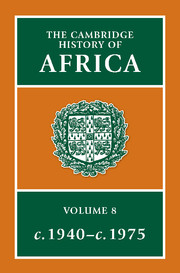Book contents
- Frontmatter
- Introduction
- 1 The Second World War: prelude to decolonisation in Africa
- 2 Decolonisation and the problems of independence
- 3 Pan-Africanism Since 1940
- 4 Social and cultural change
- 5 The economic evolution of developing Africa
- 6 Southern Africa
- 7 English-speaking West Africa
- 8 East and Central Africa
- 9 The Horn of Africa
- 10 Egypt, Libya and the Sudan
- 11 The Maghrib
- 12 French-speaking tropical Africa
- 13 Madagascar
- 14 Zaire, Rwanda and Burundi
- 15 Portuguese-speaking Africa
- Bibliographical essays
- Bibliography
- Index
- References
3 - Pan-Africanism Since 1940
Published online by Cambridge University Press: 28 March 2008
- Frontmatter
- Introduction
- 1 The Second World War: prelude to decolonisation in Africa
- 2 Decolonisation and the problems of independence
- 3 Pan-Africanism Since 1940
- 4 Social and cultural change
- 5 The economic evolution of developing Africa
- 6 Southern Africa
- 7 English-speaking West Africa
- 8 East and Central Africa
- 9 The Horn of Africa
- 10 Egypt, Libya and the Sudan
- 11 The Maghrib
- 12 French-speaking tropical Africa
- 13 Madagascar
- 14 Zaire, Rwanda and Burundi
- 15 Portuguese-speaking Africa
- Bibliographical essays
- Bibliography
- Index
- References
Summary
In 1940, Pan-Africanism seemed to be in a state of decay, yet was germinating new growth. One generation of leaders and organisations was fading. There had been no Pan-African Congress since the unimpressive New York Congress in 1927. The organiser of the four congresses between 1919 and 1927, W. E. B. DuBois, later acclaimed as the ‘Father of Pan-Africanism’, appeared to look back on them as a completed episode. His semi-autobiographical book, Dusk of dawn, published in 1940, showed minimal interest in Pan-Africanism. However, DuBois's contribution to Pan-Africanism was not only as the organiser and inspirer of occasional congresses, but also as an intellectual, making known the contribution of black people in both Africa and the African diaspora to humanity. In this respect, he was still fruitfully active. His Black folk then and now, published in 1939, was a lively and penetrating collection of essays on African and diaspora history and culture from ancient to modern times. It continued a genre he had pioneered as far back as 1915, with his book The Negro, and which he was to return to in 1947 with The world and Africa. In these works he showed himself capable of stimulating the intelligent general reader on vast, little-known themes. In spirit, these books were profoundly if not explicitly Pan-African. They dealt with Africa as a whole, defended the creativity and validity of African culture through the ages (as had the great nineteenth-century proto-Pan-Africanists, such as E. W. Blyden), and treated the history of the diaspora as a vital part of the history of Africa and Africans.
- Type
- Chapter
- Information
- The Cambridge History of Africa , pp. 95 - 141Publisher: Cambridge University PressPrint publication year: 1984
References
- 3
- Cited by

